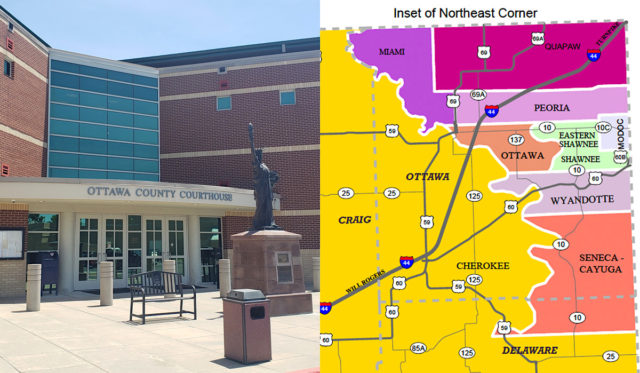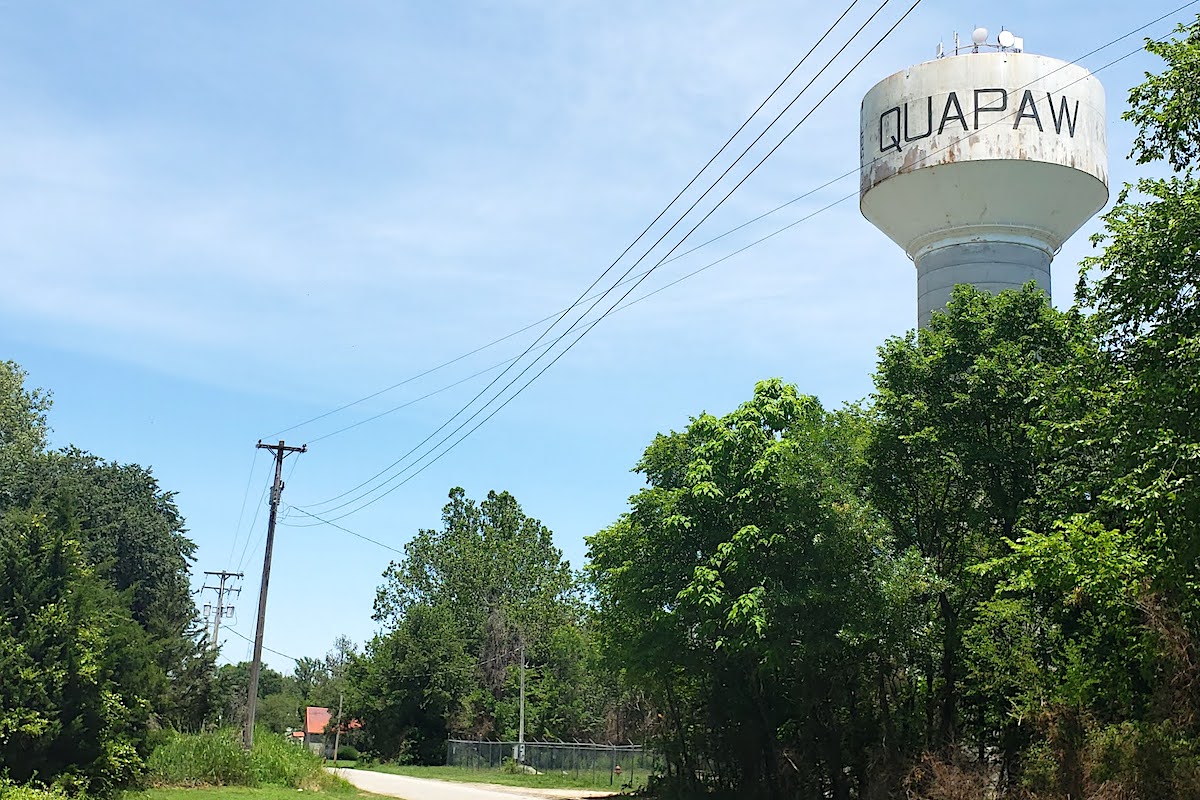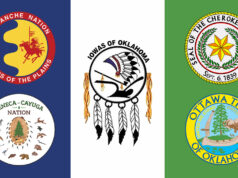

MIAMI — Over the next six months, the Oklahoma Court of Criminal Appeals is expected to make decisions about whether the landmark McGirt ruling applies to as many as eight tribal nations within Ottawa County, a situation that has left the county court system “in limbo,” according to District Attorney Kenny Wright.
Since April, Ottawa County District Court Judges Barry Denney and Becky Baird have each ruled several times that Native American defendants could not be prosecuted by the state of Oklahoma because the crimes in question occurred within the boundaries of historic reservations that have not been disestablished. Located in the northeast corner of Oklahoma, Ottawa County features the headquarters of nine tribal nations.
“We’re dealing with cases where I anticipate the Court of Criminal Appeals is going to agree with the district court that there’s still a reservation there,” Wright said.
In July 2020, the McGirt v Oklahoma SCOTUS ruling affirmed the Muscogee Nation as an Indian Country reservation as defined under 18 U.S.C. 1151a. Subsequent decisions from the Oklahoma Court of Criminal Appeals said the federal court ruling also applies to the reservations of the Cherokee Nation, Chickasaw Nation, Choctaw Nation and Seminole Nation in eastern Oklahoma. Only a tribe and the federal government — not the state — have jurisdiction to prosecute major crimes that occur on reservation land.
NonDoc participates in the Oklahoma Media Center’s Promised Land effort, which examines how the landmark McGirt v. Oklahoma decision affects both tribal and non-Indigenous residents in the state.
Now, Ottawa County is waiting for the Court of Criminal Appeals to decide whether the same situation applies to any or all of the Nine Tribes of Ottawa County, including the Peoria, Ottawa, Miami, Modoc, Quapaw, Seneca-Cayuga, Shawnee, Wyandotte and Eastern Shawnee. The county district court has ruled on the reservation question in cases dealing with all of those tribes, except Modoc. Wright’s office has appealed those eight rulings to the Court of Criminal Appeals.
In anticipation of the appellate court ruling, Ottawa County District Court is working with defense attorneys and the Ottawa County Sheriff’s Office to lower bonds for defendants or even release them on their own recognizance. The courts will have those defendants return after the OCCA has made their decisions, Wright said.
“It’s really just the people that we’re absolutely sure are immediate risks to public safety that we’re keeping locked up,” Wright said.
Denney, who became the district judge for Oklahoma Judicial District 13 in January 2019 after 20 years as an associate district judge, told NonDoc he is worried about the potential jurisdiction change and the capabilities of the tribes and the U.S. Attorney’s Office to handle the cases the state currently shoulders.
“Neither the U.S. Attorney’s Office or the tribes have been used to dealing with the humongous numbers of cases that are coming their direction from the eastern half of Oklahoma,” Denney said. “They’re going to have to likely pick and choose what cases they are able to pursue, and many cases will simply just go unprosecuted.”
A ‘hole in the law’

NonDoc left messages for Ottawa County defense attorney Andrew Meloy, who is listed on court records as representing at least three defendants in cases that have been appealed. Meloy did not respond prior to the publication of this article.
Joseph Hallorain, a tribal attorney based in Minnesota whose name appears on filings for seven of the cases, declined to comment on the situation.
Wright said crime rates are climbing in Ottawa County, which he attributed to the jurisdictional confusion surrounding the McGirt ruling. The southern half of Ottawa County south and west of the Neosho River is part of the recently affirmed Cherokee Nation reservation.
“I think we’re somewhere around 16 murders this year, which normally, three or four would have been a lot, and that’s because the criminal street gangs, the prison gangs are starting to figure this out,” Wright said. “There are ways that this system, even once it gets into its final form, can be used to organize crimes.”
Wright said he wants to see some sort of legislation — such as U.S. Rep Tom Cole’s state compacting proposal — pass in Congress to lighten the caseload on many of the tribes and U.S. attorney offices.
Wright said he wants the state to retain or regain some criminal jurisdiction because he believes only a few tribes are equipped with enough resources to handle large caseloads.
“Maybe the ones that are more equipped like Miami and Quapaw, they could go ahead and compact with the state and just try and handle a little bit of it themselves, then let us deal with all the rest of it,” Wright said.
However, Cole’s filed compacting legislation only applies to the Cherokee Nation and Chickasaw Nation. Other tribal leaders oppose the bill, such as Choctaw Nation Chief Gary Batton, who called Cole’s proposal “unnecessary.”
“I don’t want to see people intentionally victimized because of a hole in the law, because they’re tribal members,” Wright said. “And that’s where this is going to go if Washington, DC can’t fix this.”
‘It’s at our doorstep’

Joseph Byrd, chairman of Quapaw Tribe, said his tribe has been preparing to seek affirmation of its territory as a reservation since the SCOTUS ruling in McGirt v. Oklahoma last summer.
“[That ruling] verified something we’ve always known to be true, which is the boundaries of our reservations have never been disestablished,” Byrd said.
Byrd said the Quapaw Tribe has worked hard to establish a court system that is prepared to ensure public safety for citizens within its jurisdictional boundaries.
“We’ve taken a very focused approach as to the status of our tribal court system, and the things that we needed to do in order to prepare ourselves for a McGirt decision to uphold our own reservation boundaries,” Byrd said.
While Byrd believes that the Quapaw Tribe court system — established in 2017 — is ready to expand its dockets for more cases, he is also open to compacting with the state or coming to a joint agreement with the other eight tribes of Ottawa County to address the massive amount of incoming cases.
“We are open to considering all avenues at this point, whether it means compacting, whether it means doing some type of joint agreement with all of the tribes within Ottawa County. That’s definitely something that I would be interested in,” Byrd said. “We’re going to have to come together and have that conversation pretty soon, because it’s here. It’s at our doorstep.”





















